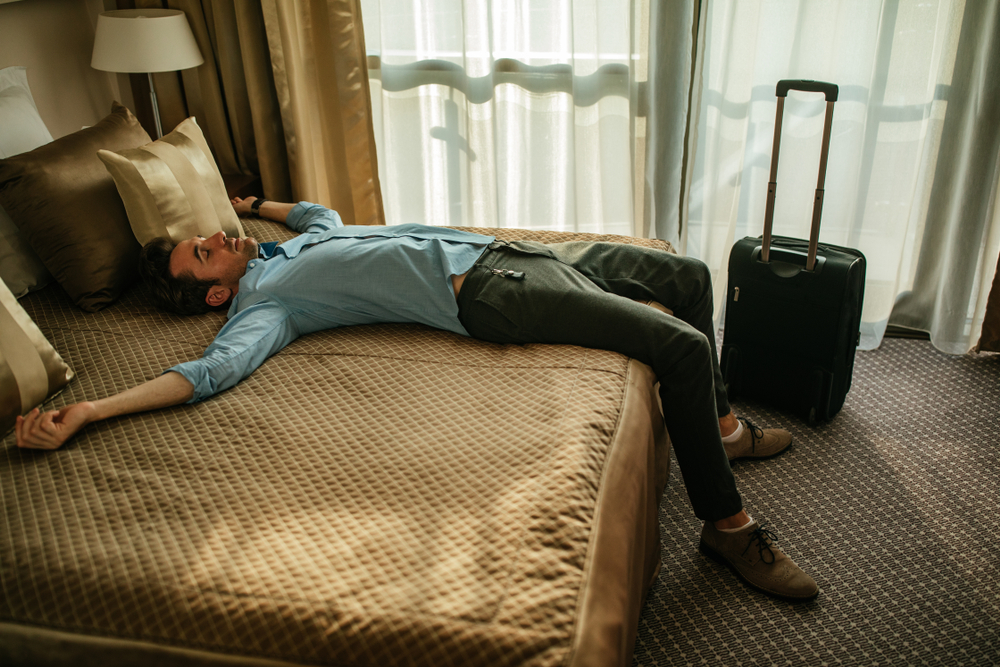Desynchronosis, another name for jet lag, is a common disorder that arises when traveling across multiple time zones and throws off your body’s internal clock. Fatigue, insomnia, agitation, and trouble focusing are some of the symptoms that can seriously affect your trip. Nonetheless, you can lessen the effects of jet lag and transition to new time zones more easily if you employ the appropriate techniques. We’ll look at practical strategies in this guide to help you overcome jet lag and get the most out of your trips.
Understanding Jet Lag
It’s important to comprehend the factors that lead to jet lag’s onset before diving into strategies to combat it. When your body’s internal clock, or circadian rhythm, is not in sync with the local time at your destination, it can cause jet lag. Your natural sleep-wake cycle is disturbed by this misalignment, which causes fatigue and confusion as symptoms.

Modify Your Sleep Schedule Gradually
A good way to lessen the effects of jet lag is to gradually change your sleep schedule in the days before your trip. Try going to bed and waking up an hour earlier every day for a few days prior to departure if you’re traveling east. On the other hand, if you’re heading west, gradually move your wake-up and bedtime later. This gradual shift can lessen the intensity of jet lag symptoms upon arrival and facilitate the adjustment to the new time zone.
Maintain Hydration
Being dehydrated can make jet lag symptoms worse, so it’s critical to drink plenty of water throughout your trip. To keep your hydration levels as high as possible during and after your flight, drink a lot of water. Steer clear of excessive alcohol and caffeine intake as these can cause dehydration and interfere with your sleep-wake cycle. As an alternative, choose herbal teas or water to stay hydrated and encourage calm.
Get Sunlight Exposure
One of the most effective ways to control your body’s internal clock is to expose yourself to natural sunlight. When you get to your destination, go outside for some daylight time to help reset your circadian cycle. To absorb sunlight and tell your body that it’s time to wake up, go for a stroll, sit in the sun, or partake in outdoor activities. On the other hand, reduce your exposure to artificial light in the evening, particularly blue light from electronics, to encourage the production of melatonin, a hormone that controls sleep.
Strategic Nap
Even though it could be alluring to doze off for a while when you get to your destination, doing so too much during the day can worsen jet lag symptoms and further disturb your sleep-wake cycle. Instead, to combat fatigue and increase alertness, aim for quick, well-timed naps. Naps should only be taken for 20 to 30 minutes in the morning to prevent disrupting your sleep at night. If you must take a nap later in the day, don’t sleep in too late or too early.
Continue Eating Nutritiously
Regularly eating meals that are well-balanced can support your body’s natural rhythms and lessen the effects of jet lag. Select wholesome foods like lean proteins, whole grains, fruits, and vegetables that offer long-lasting energy. Steer clear of heavy, greasy meals and sugary snack consumption, as these can cause energy crashes and interfere with your sleep cycles. Furthermore, watch portion sizes and refrain from overindulging, particularly in the evening when it can be more difficult to fall asleep.
Stay Active
Frequent exercise is crucial to your jet lag recovery plan because it can fight fatigue, elevate your mood, and encourage sound sleep. When you reach your destination, increase your energy and circulation by walking, cycling, or doing yoga. These are examples of light to moderate exercise. Try to get in at least 30 minutes of activity every day, but stay away from intense workouts right before bed as they can keep you from falling asleep.
Taking Melatonin Supplements
Supplementing with melatonin is a well-liked way to reduce the symptoms of jet lag and encourage higher-quality sleep. The hormone melatonin, which the body naturally produces in reaction to darkness, aids in the regulation of the sleep-wake cycle. In the new time zone, taking a melatonin supplement can help you improve the onset and duration of your sleep by resetting your circadian rhythm. Before taking melatonin, though, it’s imperative to speak with a healthcare provider because it may not be appropriate for everyone and may interfere with certain medications.

Calm Nighttime Routine
Your body can be told to wind down and get ready for sleep by developing a relaxing bedtime routine. To encourage relaxation and lower stress levels before bed, try reading, doing light stretching, or taking a warm bath. Maintain a calm, dark, and cool bedroom and refrain from engaging in stimulating activities like watching TV or using electronics in bed to create a conducive sleep environment.
Conclusion
For tourists hopping between time zones, jet lag is a common but manageable problem. You can maximize your travel experience by minimizing the effects of jet lag and adjusting to new time zones more easily by putting these strategies into practice. You can arrive at your destination feeling rejuvenated and eager to explore by taking proactive measures to support your body’s natural rhythms, such as gradually modifying your sleep schedule and maintaining an active and hydrated lifestyle. Happy travels!


